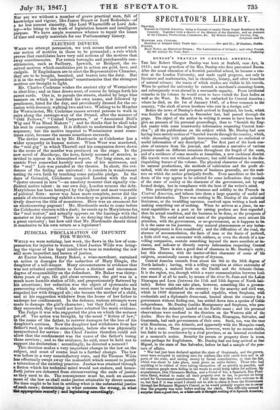JUDICIAL PROCLAMATION OF IMPUNITY FOR WRONG.
WHILB we were noticing, last week, the flaws in the law of com- pensation for injuries to women, Chief Justice Wilde was bring- ing the vigour of his legal intellect to bear in rendering the law gill more imperfect and 'barren of justice.
At Exeter Assizes, Henry Baker, a wine-merchant, sustained an action in damages for the seduction of Mary Dingle, the daughter of a toll-keeper. Many circumstances in evidence that was not rebutted contribute to fasten a distinct and uncommon degree of responsibility on the defendant. Mr. Baker was thirty- three years of age, the girl about seventeen; the girl was in a much more humble station of life, and proportionately flattered by his attentions ; her seduction was the object of systematic and persevering attempts, which she resisted until one day when he stupefied her with drugged ale ; she became the mother of a child, and at his suggestion withdrew from the house of her father to undergo her confinement. In the defence, various attempts were made to damage the girl's character ; but they failed ; and had they succeeded, they would not have rebutted the main evidence. The Judge it was who suggested the plea on which the seducer got off. The action was brought, by the usual "fiction of law," in the name of the father, to recover damages for the loss of his daughter's services. Now the daughter had withdrawn from her father's roof, in order to concealment, before she was physically incapacitated for service : the Chief Justice therefore could not allow that the confinement was the cause of the father's losing those services ; and so the evidence, he said, must be held not to support the declaration : accordingly, he directed a nonsuitl
This decision makes a very important change in the law on the subject, and must of course lead to a farther change. The law was before in a very unsatisfactory, state, and Sir Thomas Wilde has effectually swept away the makeshift which seemed to justify a toleration of the existing practice. Justice was attained through a fiction which his technical mind would not endure, and hence- forth juries are debarred from circumventing the ends of justice as they used to do. The consequence must be, such an amend- ment of the law as shall make justice attainable by direct means. No time ought to be lost in settling what is the substantial justice of such cases ; determining in what consists the wrong, in what *inappropriate remedy; and legislating accordingly.


























 Previous page
Previous page